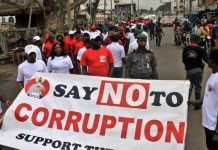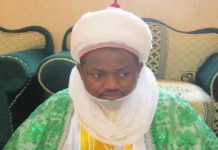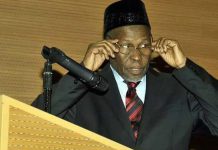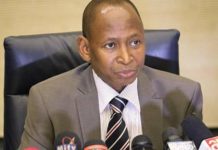By Abba Hamisu Sani
Africa-Press-Nigeria Nigeria, which is the most populated country in Africa, has consistently been ranked high in corruption by Transparency International and other notable organizations that monitor corrupt practices around the world. High corruption rankings affect almost all Nigerians who migrate to foreign countries, as foreigners have the perception that since Nigeria is corrupt, so too are all Nigerians.
In the year 2000, Transparency International conducted a survey on the corruption levels of 90 countries, including Kenya, Cameroon, Angola, Nigeria, Côte-d’Ivoire, Zimbabwe, Ethiopia, Ghana, Senegal, Zambia, India, Venezuela, Moldova, and others. Nigeria was ranked as the most corrupt because the country occupied the 90th position in terms of transparency.
In 2001, Nigeria was ranked the second-most corrupt nation in the world out of 91 countries, second only to Bangladesh. This shows that corruption in Nigeria improved by one step when compared to its ranking in 2000.
Still from the same source, in the year 2002, Nigeria was again ranked the second-most corrupt country in the world, after the organization surveyed 102 countries. Nigeria was seen at the bottom, occupying the 101st position in terms of Confidence Interval (CI).
In 2003, Nigeria received the same ranking, making no improvements from 2002.
2004’s ranking showed a little improvement when compared to the previous four years. Nigeria was ranked the third most corrupt country in the world in that year, performing better than Bangladesh and Haiti. That year, 146 nations were surveyed.
The record on the corruption in Nigeria really improved in 2005. The number of countries surveyed by the Transparency International was 158. Nigeria was ranked eighth most corrupt.
More countries were surveyed by Transparency International in 2006. 163 countries were surveyed that year. The results showed some improvement, and Nigeria was ranked the 21st most corrupt country in the world. Haiti was the world’s most corrupt nation that year.
Among the 180 countries surveyed in 2007, Nigeria ranked 147 on the table alongside Angola and Guinea-Bissau. This result shows that Nigeria was 33rd most corrupt country in the world.
An analysis of the anti-graft/anti-corruption laws in Nigeria shows that corruption will continue in spite of the law because the perpetrators do not fear any consequences (Oyinola 2011).
In 2012, Transparency International again deemed Nigeria one of the most corrupt nations in the world (Uzochukwu 2013). That year, the country ranked 139th out of the 176 surveyed countries, making Nigeria the 37th most corrupt nation.
In 2013, Nigeria ranked 144 out of 177 surveyed countries in terms of transparency. The score made Nigeria 33rd most corrupt country in the world that year. The result published by the organization also showed that Nigeria scored 25% out of 100 in terms of transparency.
In the 2014 ranking, Nigeria was ranked 136 out of 174 surveyed countries (Transparency International 2014). The result showed that there was improvement, though things were still bad. Nigeria was the 38th most corrupt country in the world in 2014 from the survey.
With the emergence of a new government in the year 2015, many Nigerians were hopeful that the country’s corruption level will be minimized. That year, power was transferred from the People’s Democratic Party (PDP) to All Progressive Congress (APC). One of the campaign promises made by the President Muhammadu Buhari was the massive eradication of corruption in the country.
But the question that Nigerians have been asking since the leadership of President Buhari till date is “is President Buhari’s government fighting corruption as he promised during his campaign?” Nigerians are tired as they found out that the government is not really fighting corruption. There are incidences were the man that said he strongly believes and practices transparency failed. This is made clear through the words of PDP 2019 presidential candidate, Atiku Abubakar. He stated in December 2018:
“Mr. President, the problem with your anti-corruption war is not the system. You are the problem!
The system allows you to arrest, try and convict your former Secretary to the Government of the Federation, who was fingered in a major corruption case, but you chose to let him go scot free and you demonstrated your tolerance for his corruption by giving him a prominent role in your re-election campaign and recently welcoming him to the Presidential Villa with open arms”.
Irrespective of the campaign promises, Nigeria ranked low in transparency and high in corruption in that 2015. In 2015, out of the 168 countries surveyed, Nigeria was the 32nd most corrupt.

Over two-thirds of the 176 countries and territories surveyed in 2016 fall below the midpoint of Transparency International scale of 0 (highly corrupt) to 100 (very clean). In that year’s survey, Nigeria sat at number 136 on the table with Guatemala, Kyrgyzstan, Lebanon, Myanmar, and Papua New Guinea. From calculation, it shows that Nigeria and the mentioned countries were ranked 40th most corrupt in 2016.
In 2017, there was no remarkable improvement in transparency in the country. Irrespective of the promise made by the current president to fight corruption, it appears that the former President Goodluck Jonathan did quite better than him when compared with his 2014 results before he left the presidential seat.
It was very disappointing that in the 2017 Corruption Perception Index released by Transparency International in 2018, Nigeria has relapsed deeper into corruption—moving 12 steps backward from 136 to 148 (Vanguard news 2018) with respect to the 2014 results.
In the year 2018, Corruption Perception Index ranked 180 countries and territories. Nigeria occupied number 144 on the table with Comoros, Guatemala, Kenya and Mauritania. Also the score of the country in that year was 27 which was same with that of 2017. Based on the position of 144 on the table, it indicated that Nigerian was the 36th most corrupt country in the world in 2018.
Nigeria failed when it came to transparency in the country’s government. By contrast, in 2013, Denmark and New Zealand scored highest at 91% each, meaning the countries are clean and have higher Confidence Intervals than Nigeria. In other words, Nigeria is highly corrupt.
Corruption in Nigeria hurts a lot of people, as the money that would have been used to reduce poverty in the country is being channeled into the pockets of a select few.
What can we say about the $2.1 billion arms deal? The money that was budgeted for the purchase of arms in the fight against Nigeria’s Boko Haram insurgency group suddenly disappeared. Whether the fund developed legs and ran away is what the Federal Government of Nigeria could not explain to its citizens.
The stain of corruption did not spare anti-graft agencies, as former Chairman of the Economic and Financial Crimes Commission, EFCC, Ibrahim Lamorde, was accused of fraudulently diverting N1tn proceeds from corruption recovered by the agency (Adeyemi 2016). This is incredible, as those who were appointed to fight corruption in the country are also found to be victims of the same problem they fight. That is to say, trust is difficult in Nigeria.
Corruption is not only experienced among the Presidents of the country—many governors have been found guilty of it, too. It’s like a disease that spreads from mother to child. The News Agency of Nigeria (NAN) reports that Nyako, the former governor of Adamawa, and seven others, including companies, are standing trial before Justice Okon Abang on a 37-count charge bordering on money laundering. The news was published on December 1, 2016 (Pulse 2016).
The governor opened 30 different accounts to siphon funds at Zenith Bank of Nigeria using different names. Among the offenses the ex-governor is being accused of are criminal conspiracy, abuse of office, opening of multiple bank accounts, and stealing to the tune of ₦29 billion (twenty-nine billion naira).
The former president of the country, Olusegun Obasanjo, while speaking at the first Akintola Williams Annual Lecture in Lagos on November 24, 2016, reacted negatively to the level of corruption going on among the members of the House of Assembly and House of Representatives. Quoting from the writings of Jola Sotubo “Former President, Olusegun Obasanjo described the National Assembly as a den of corruption (Jola 2016)”. Part of the speech delivered by the ex-president, which hammered on the level of corruption among the members of the house, states:
“Members of the National Assembly pay themselves allowances for staff and offices they do not have or maintain. Once you are a member, you are co-opted and your mouth is stuffed with rot and corruption that you cannot opt out as you go home with not less than N15 million a month for a senator and N10 million a month for a member of the House of Representatives”.
According to Lewis Obi, the National Assembly is nothing but a business enterprise, and the primary objective of the members is to make money for themselves. He further explained that the country’s National Assembly is the highest-paid legislature in the world. The Chamber earns more than that of United States of America and yet American economy is far much better than that of Nigeria.
According to the documentation, United States senators make an approximate annual income of $174,000.00, while that of Nigerian senators is $2,183,685.00 (reported via Authoritative Economist Magazine). You cannot imagine the degree of disparity between the two.
Faces of Corruption
Corruption takes many forms and can be interpreted in many different ways. It is hard to enter any sector in Nigeria without observing one corrupt practice or another. In fact, corruption is not only observed in the public sector and politics.
Books have been written and press companies have published articles about the high level of corruption in Nigeria politics, yet the perpetrators pretend as though they are not the people being talked about. They believe they are above the law. But little do they understand the injuries they are causing to the country and the citizens.
Corruption takes many forms, starting with embezzlement, bribery, rituals, and election rigging. In fact, corruption levels are highest in Nigeria’s political system. In both the Senate and the House of Representatives, corruption is seen as normal.
Where do we start among politicians? Due to the “wicked level” of corruption, both the young and the old struggle to align themselves one political party or the other. They believe that once they take any position in politics, even a low-level position, they will use corrupt tricks to fill their pockets with public funds.
Embezzlement
Embezzlement of public funds is common. Many leaders have helped boost the economies of other nations by depositing embezzled money into foreign banks.
Political corruption is persistent in the Nigerian state. Since the creation of modern public administration in the country, there have been cases of official misuse of resources for personal enrichment (Storey Report 2014). After the death of the former president, Sani Abacha, an investigation was carried out to determine the amount of money he embezzled in gas plant construction in the country. The investigations led to the freezing of accounts containing about $100 million United States dollars that he stole (Hector 2004).
The Abacha administration notoriously looted upwards of $3 billion in the 1990s (Uzochukwu 2013). The federal government’s agreement with the Swiss government on the return of looted funds traced to former Head of State General Sani Abacha led to the remittance of US$322 million in December 2017 (Webby 2018).
The plan is to distribute the returned money among Nigerians, which was confirmed through the publication of Transparency International in August 2018. It stated:
In Nigeria, plans are in motion to distribute US$322 million recovered in Switzerland from the late General Sani Abacha, the country’s former military ruler.
Before now, some funds were returned to Nigeria by the Swiss bank in 2006 from the money stolen by the same former president. In 2006, US$723 million illicitly acquired by Abacha’s family was returned to Nigeria from Switzerland (Transparency International 2018).
Missing Children
As of a few years ago, whenever it was time for an election in Nigeria, small children across the country began to go missing. Child kidnapping during that period was rampant and parents were usually advised to guard their children against ritualists. But why was it like that and what happened to the kidnapped children?
This is another face of corruption—one that breaks the hearts of mothers. The missing children were used by contesting politicians to perform ritual killings in order to get protection and devilish powers that would enable them to win elections. This is corruption and wickedness in the highest order because it involves the termination of human life. Those who take part in that practice have their own children at home, yet went on capturing and killing the children of others. This practice hasn’t stopped, but it has slowed down.
Election Rigging
Election rigging is not an unheard-of phenomenon. During elections, the candidates hire thugs who go around the election polling stations to highjack the ballot boxes. When they steal these boxes, they then write in votes for their candidate. In recent times, a new tactic that contestants have adopted is buying voters’ cards so that they can manipulate and use the cards to their advantage.
Bribery
On many occasions, politicians have bribed top officials to commit illegal acts to their favor. Some political leaders, including governors and presidents, have been sued by opponents, but the sued were able to escape punishment by bribing attorneys and judges. At the end of the judgment, the leader who bribed someone won the case.
University of Nigeria Nsukka. It is one of the oldest universities in the country located in Enugu state.
Corruption in Universities and Colleges
Nigerian universities rank low in the world and such is traceable to corruption in the land. It is not news to any Nigerian that corruption is rampant in universities, polytechnics, and colleges. There are certain things that lecturers do that deserve “hot punishment.” Most lecturers use the opportunities they have to take advantage of others.
Harassment of women by lecturers and pressure to sleep with them is common. The most painful part of it is that some of them are married, yet they are not satisfied. After female undergraduates submit to the lecturers’ requests, they are rewarded with good grades.
Universities have been complaining about the number of funds allocated to them. Corruption is one of the biggest challenges faced by the education system. A lecturer in the Department of Metallurgical and Materials Engineering at a university located in Anambra State had this to say on the nature of the poor standard of the foundry:
“What makes our foundry to be of a low standard is… corruption. An organization gave the department some money that would have been more than enough to upgrade and standardize the foundry, but I do not know what the management of the department did with the money.”
How do some students find their way into the universities? Some are there not by merit, but through a kind of bribery called sorting. Some rich men in the country bribe vice chancellors and heads of departments to secure admission for their children. When this kind of dirty practice is conducted, those who would have made it on merit are cheated, as admission will not be offered to them. Every university in Nigeria has a quota (maximum number of students) they can admit each year.
Corruption in the Police Force
Where do we start when it comes to the nature of corruption observed in the police force? Do we start with bribery, intimidation, sexual harassment of young inmates in prison, or the fact that they truths upside down?
There is a saying that “police are your friends” in Nigeria; policemen are your enemies because they can deny the truth and collect bribes to do so. Because of the encounters many Nigerians have had with policemen, even the good ones among them are generalized as being bad. What a shame.
The police who work in some checkpoints on the expressways cannot do so without collecting bribes from car owners and drivers. Their interest lies in collecting money from drivers and not in securing the road. Bribes become compulsory even when your particulars are in order.
Bus drivers must offer money before they continue with their transportation business, be it one hundred naira (₦100 = $0.26) or two hundred naira (₦200 = $0.52). The police are now turning to gods that receive money from the worshipper as an offering.
Some female prison inmates come out of prison pregnant. What this implies is that the policemen sexually assault women who are imprisoned. The women may say no, but because the policemen have guns, the women cannot do anything. They were impregnated before they were granted bail. What kind of prayer will erase this kind of abomination?
Corruption in Nigerian Football
Corruption is like a curse that’s been laid upon us. Even football has corruption. Players are not chosen by merit. It is all about who you know in top political offices or society.
In the Nigerian Football Federation (NFF), corruption is the reason why Mr. A is elected as the leader of the group today and tomorrow the election is nullified and Mr. B will be chosen. Everybody wants to be at the head so that he will fill his bag with the national cake. People do not fight to work because it is stressful, so whenever people fight for a particular position, there is every possibility that they are there to clean out the organization.
Reports and evidence have shown that there are corrupt practices in Nigerian football. A BBC news report said this: “A senior football official and a club administrator have been banned for 10 years following their involvement in corruption, the football authority has announced” (BBC Sports News 2013). Match-fixing and corruption is a problem in Nigerian football and has lead to sanctions against a number of clubs, referees and officials (Oluwashina 2013).
A referee (the name of whom was withdrawn) who is currently a Catholic priest serving in a parish in Anambra, once gave his experience on the level of corruption in football. According to the priest, he said that he narrowly escaped death when he officiated a match in the local league. He stated:
After the first half of the match, none of the two sides scored any goal. Before the beginning of the second half, some officials and young youths who were supporting the club at home side came and said to me: if you want to leave this pitch alive, make sure that you do anything possible to see that our club win this match.
The young referee was frightened by the threat, and finally, the home side won the match with a lone goal. The inability of Super Eagles of Nigeria to qualify for 2015 Africa Cup of Nations (AFCON) can be attributed to corruption.
Corruption in Churches
When churches are corrupt, what hope do Nigerians have? The truth is that not all the churches in the country are equally corrupt. Corruption is witnessed mainly in the “new generation churches.” That is why many of their members are secretly angry.
New generation churches in this context are those churches that do not have solid origin or foundation. They are not like Catholic, Anglican, or Orthodox churches. New generation churches are churches that start when a person who calls himself a pastor goes and rents a room, decorates it, and convinces people to join him, claiming that he has been given the power to summon signs and miracles from God.
Imagine you have been dying of hunger for years and a man claims that you should come to him because he has been called by God, and can transform your financial status. It is a common thing they say to make hungry Nigerians yield to their deceptions. The people come and the so-called pastors use their tricks to collect the money that is remaining in the pockets of the country’s poor.
Some of the pastors go to the extent of using magical and devilish powers to run their church business in the name of God’s power. They give the congregations what they want without them knowing the source of their so-called power. If women are in search of babies, the babies may be given to them through devilish means. Today, one of those children might steal money from a bank through armed robbery and tomorrow kill an innocent person, operating under the influence of the devil.
Pastors have, on many occasions, been caught committing adultery and fornication. It is not new and it is certain that you as a reader have heard about such shameful acts. The immoral acts committed by Nigerian pastors have been observed through newspapers, televisions, and other channels.
In early November 2014, there was a radio program from Blaze FM, Orifite, on a pastor that impregnated an 11-year-old girl. According to the report, the girl was impregnated by the pastor when her mother took her to the pastor’s place for prayers and left on her own business.
Internet Fraud
Fraudulent Internet activity is another face of corruption. Graduates and non-graduates who lack the knowledge and skills to help them earn money find joy in Internet fraud. It is a criminal act and deserves serious punishment. Among the classes of offences committed in Nigeria, both the Senate and members of the House of Representatives are working hard to see that those caught in such acts face the punishments they deserve without any favour.
Some Nigerians, mainly youths, have been scamming their fellow citizens using illegal means. Some host websites online that claim to be giving jobs to job seekers, and scam any who fall prey to their tricks. They tell job seekers to make certain payments for processing documents without them knowing that they will not be issued any job. Some Nigerians have had money stolen by these cybercriminals.
The level of corruption in Nigeria has made many citizens of the country show no respect for holy and godly affairs. This is seen in the report given by the spiritual director of Adoration Ministry Enugu Nigeria, AMEN, in December 2014.
According to the spiritual director, Rev. Father Ejike Mbaka, some Nigerians impersonated him through websites and social media sites, specifically Facebook. He lamented that these criminals used his picture to deceive people and collect money from them while claiming they were Fr. Mbaka. The notable reverend father made it clear that he is not on Facebook, nor does he own a website with his name. He went further to say that anyone caught in that act will dance to the music that he or she deserves, and the police have been involved to find the criminals.
Corruption in the Customs Service
Are Nigerian customs really doing the work they are hired to do correctly? The customs service of Nigeria is the organization that is authorized to clear goods imported into the country. This group is not free from the menace of corruption.
On most occasions, you must pay bribes to customs before your goods are cleared. Many containers are held captive by customs because the owners are not willing to pay the large amount of money being demanded.
Causes of Corruption
A number of issues cause corruption, and among them are:
– Greed
– Poor youth empowerment
– Poverty
– Unemployment
1. Greed
Greed has caused a lot of crises in the world, including in Nigeria. It is because of greed that political leaders embezzle the funds they are supposed to use for national development for their own selfish needs.
2. Poor Youth Empowerment
Poor moral youth empowerment is a contributor to corruption. Internet fraud, sexual harassment by male CEOs, and other bad acts occur because Nigerians lack understanding of the importance of youth empowerment. When parents and governments empower youths both financially and morally, the level of corruption will diminish.
3. Poverty
According to international standards of poverty, a person is said to be poor when he lives under $1.25 (₦210, although it varies) per day. There are many poor people in Nigeria, and poverty pushes them into corruption. According to World Bank Group, in 2004, 63.1% of Nigerians were poor. The poverty level increased in 2010. In 2010, 68% of the Nigerian population was estimated to be poor. A person can take bribes to commit crime because he is poor. It is one of the reasons why the poor youths in the country collect bribes to work as thugs for Nigerian politicians.
4. Unemployment
Unemployment is one of the major challenges in Nigeria and does not need much explanation because it has broken the hearts of many citizens. People are pushed into corrupt practices because of the high unemployment rates. An unemployed citizen can indulge in corruption to make money and live better.
The youths, fathers, and mothers are seriously concerned about the negative impact of unemployment in their lives. Some have said that it is better to die than to suffer the torment of unemployment in the country. Words cannot explain the level of punishment the citizens of this country face as a result of this menace.
Effects of Corruption
The negative consequences of corruption are many, and among them are:
– Poor investment
– Rise in poverty
– Poor national development
– National crises
1. Poor Investment
Unemployment in Nigeria would have been eradicated to some extent if only investors were attracted to doing business in the country. Companies that would have invested in Nigeria are afraid because they do not know if the corrupt practice will ruin their industries over time. Because of this concern, they refuse to invest in Nigeria.
2. Rise in Poverty
When the heads of public service are busy laundering the money that is supposed to be used to create employment for the masses and reduce poverty, what happens is a rise in the poverty level of the country, just like the rise in poverty shown by the statistics between 2004 and 2008. Since the government is selfish and does not want to help the poor, poverty continues to rise in Nigeria.
3. Poor National Development
Any country with high corruption levels is likely to experience developmental bankruptcy. When some CEOs indulge in corrupt practices to make their money, economic development will suffer. When Nigerians keep on shifting the country’s currency to foreign countries, there will be less economic development in Nigeria.
4. National Crises
So many crises in Nigeria today are a result of corruption. The insecurity in Nigeria brought about by Boko Haram is a consequence of corruption. Corrupt politicians are fighting the government of President Goodluck Jonathan using Boko Haram as their agent because they do not want him to succeed. The attacks by Boko Haram have caused disorderliness in Nigeria and seriously affected the country’s economy.
Eradicating Corruption
Corrupt Nigerians do not truly understand the harm they are causing to other citizens. Corruption could be reduced by these potential solutions:
– Self-satisfaction
– Institution of strong anti-corruption groups
– Employment generation
– Proper government funding of schools
– Treating all citizens equally
1. Self-Satisfaction
Self-satisfaction in this context implies being content with what one has. When the leaders of Nigeria are satisfied with the salary they are paid and use public funds in a proper manner, the issue of embezzlement and money laundering will be history. Managers who are satisfied with what they are paid will not have time to indulge in corruption to make more money.
2. Institution of Strong Anti-Corruption Groups
Creating strong anti-corruption institutions is another arsenal to win the fight against corruption. This group is to work independently with the government to ensure transparency. Anyone who is caught engaging in corrupt practices by the group should experience the consequences decided by the anti-corruption agency. That he is a minister or governor of a state should not be an excuse from facing the punishment he is to receive according to the Constitution of Nigeria.
3. Employment Generation
The unemployed in the country find themselves involved in corruption mainly because they want to make money to meet the demand of the day. Governments and capable hands should endeavour to generate more jobs for citizens to get employed and paid in return. A busy mind may find it difficult to indulge in corruption because he is being paid adequately.
4. Proper Government Funding of Schools
Understanding the importance of skill acquisition will go a long way to propel them to develop all the schools in Nigeria. When more attention is paid to the tertiary institutions in the country, it will produce graduates who are employable. Installation of the necessary machines needed in universities will help Nigerian graduates acquire skills and use them to generate income, even if no company employs them after graduation.
Self-employment will make graduates more determined in the work they do and will prevent them from corruption like Internet scams, kidnapping and the rest.
5. Treating All Citizens Equally
Treating any offender in the country equally will help reduce corruption. Nobody is above the law and any who acts contrary to it should be given the punishment that he or she deserves. That she is the Minister of Aviation or Governor of the Central Bank of Nigeria should not count in this case. If any minister or head of state is given the punishment he deserves for corruption, others will learn and separate themselves from any corrupt practice.
Message to the Nigerian Leaders
Irrespective of the position you are holding, whether big or small, you need to do well. You have to maintain certain level of decency in your leadership to make the country better. You are killing the country and the citizens by not doing what you have to do and do them rightly.
Even if you are holding the position of a Local Government Chairman, you lead them well. You may not be 100% clean but make sure you make positive influence. Do not steal from the people you lead because you have the privilege to occupy such position. Impunity is high in the Federal Government of Nigeria and tidying it up to some extent involves cleaning from bottom to top.
If you are allocated some funds to use in the development of your local government, ensure you show some example of a good leader by using the money for what it is meant. If you must steal, use your brain and not emptying everything.
You as a top officer in the Nigerian government travel from one developed country to another. You travel to United States, Canada and United Kingdom and you are happy being there. But know that that is not your country. Some leaders shun corruption and decided to do things right before they were able to achieve such milestone.
You can achieve similar thing if you decide to reduce corruption and do things in the right way. If you want to smile as you did when you got to developed countries, start building your own home. Stop being intellectually poor by stealing what is meant for all for your personal use.
It is selfishness and corruption and that will make the country not to grow. It is time Nigerian leaders have to wake up. When you steal from the country you lead, you steal from yourself and it will always make us stagnant. Let all the country’s leaders say no to corruption.
Conclusion
Remaining corrupt as a country is not a good record. Corruption is a cankerworm that has eaten deep into the fabric of Nigerian society.







